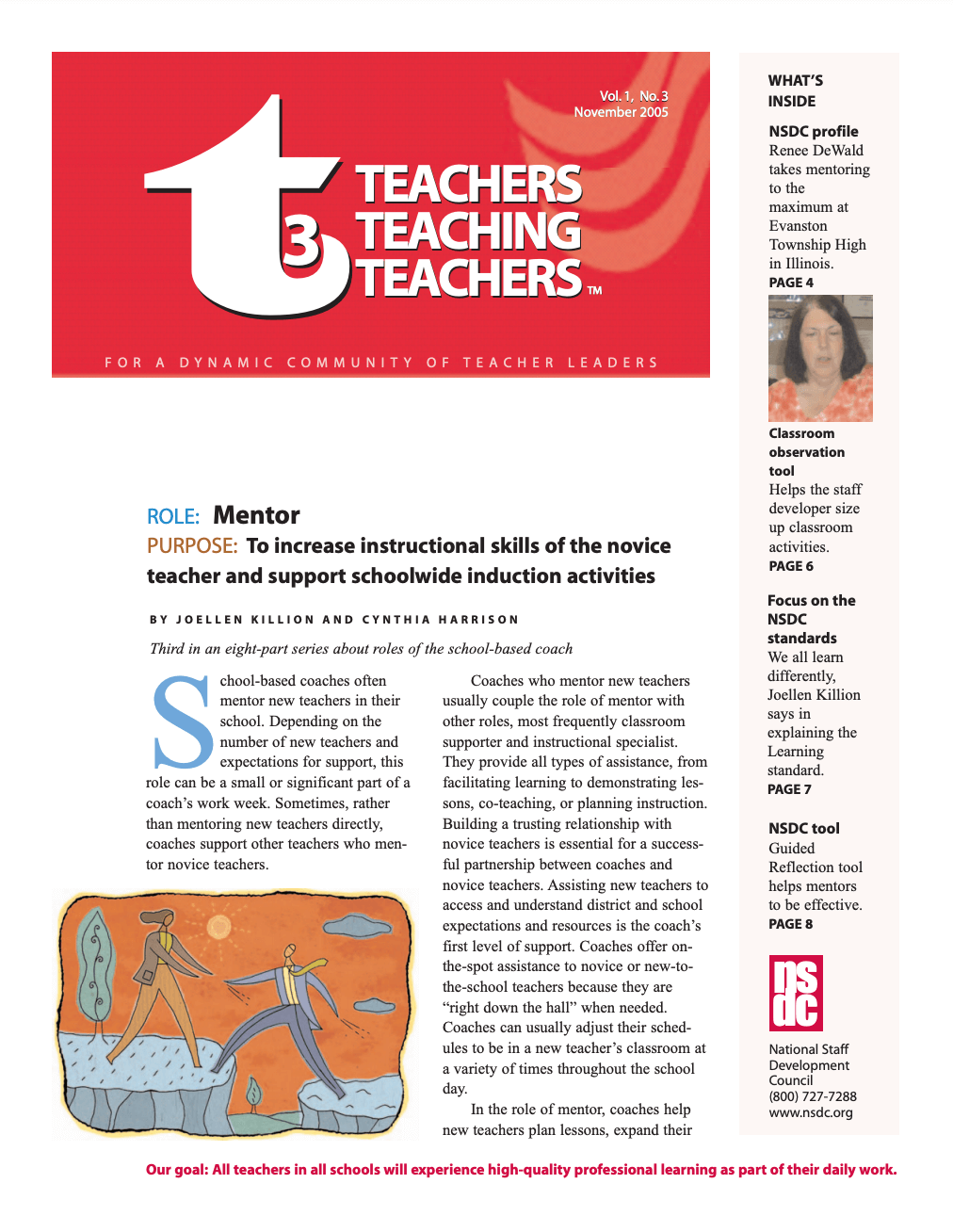
Teachers Teaching Teachers, November 2005, Vol. 1, No. 3

Role: Mentor
The school-based coach often serves as a mentor to new teachers. In this role, coaches call upon their knowledge of instructional strategies, classroom management, and the culture of a specific school. They must also understand the stages of teacher development and adjust support to meet novice teachers' needs. Learn more about the challenges and skills associated with the mentor role and read about the strategies one mentor uses in a scenario illustrating the mentor at work.
By Joellen Killion , Cynthia Harrison
NSDC profile: Renee DeWald--Creating a legacy of relationships
As induction coach at Evanston Township High School in suburban Chicago, Renee DeWald supports new teachers throughout the year. She starts with a multi-day course before the school year begins. Her year continues with one-on-one mentoring and observation, sessions on professional days, and coordination of other mentors. And, she still teaches four periods of chemistry each day.In this profile, DeWald shares what she values and what she has learned in her position. She also provides a tool for recording classroom observations.
By Joan Richardson
Focus on the NSDC standards: Listen to understand teachers' unique needs
Coaches and school leaders tend to be eager to embrace innovation. Yet the people they coach are at a wide range of levels of readiness for change. Teachers with more experience have different concerns than novice educators. At the same time, teachers, like students, learn in different ways.Read how one math coach gauges needs to provide relevant support in a standards-driven learning culture.
By Joellen Killion
NSDC tool: Guided reflection
In this issue: Role: Mentor NSDC profile: Renee DeWald--Creating a legacy of relationships Focus on the NSDC standards: Listen to understand teachers' unique needs NSDC tool: Guided reflection Don't miss past issues!
Role: Mentor By Joellen Killion and Cynthia Harrison
The school-based coach often serves as a mentor to new teachers. In this role, coaches call upon their knowledge of instructional strategies, classroom management, and the culture of a specific school. They must also understand the stages of teacher development and adjust support to meet novice teachers' needs.
Learn more about the challenges and skills associated with the mentor role and read about the strategies one mentor uses in a scenario illustrating the mentor at work.
This role is the third to be covered in an eight-part series about the school-based coach. From September's issue of Teachers Teaching Teachers, read about the role of the learning facilitator. Explore the role of data coach in the October issue.
NSDC profile: Renee DeWald--Creating a legacy of relationships
By Joan Richardson
As induction coach at Evanston Township High School in suburban Chicago, Renee DeWald (on right in photo) supports new teachers throughout the year. She starts with a multi-day course before the school year begins. Her year continues with one-on- one mentoring and observation, sessions on professional days, and coordination of other mentors. And, she still teaches four periods of chemistry each day.
In this profile, DeWald shares what she values and what she has learned in her position. She also provides a tool for recording classroom observations.
Focus on the NSDC standards: Listen to understand teachers' unique needs
By Joellen Killion
Coaches and school leaders tend to be eager to embrace innovation. Yet the people they coach are at a wide range of levels of readiness for change. Teachers with more experience have different concerns than novice educators. At the same time, teachers, like students, learn in different ways.
Read how one math coach gauges needs to provide relevant support in a standards-driven learning culture.

